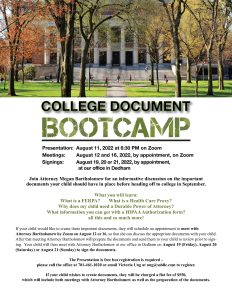It’s fall again and October is the time of year when the Massachusetts Chapter of the National Academy of Elder Law Attorneys (“MassNAELA”) celebrates Special Needs Law Month by hosting valuable legal education programs for attorneys regarding new developments in special needs law. MassNAELA also distributes copies of its Special Needs Advocacy Toolkit, which is accessible to the public and provides tools to help people advocate for the rights and well-being of individuals with special needs. The Toolkit provides important information on financial management, as well as an understanding of Medicare and Medicaid, a student’s right to an independent educational plan, housing options, and other issues. You can find the Second Edition of the Toolkit here: https://massnaela.com/wp-content/uploads/2021/10/MassNAELA-Special-Needs-Toolkit-Second-Edition.pdf
Not only are many of our attorneys here at Samuel, Sayward & Baler active in MassNAELA, our senior associate attorney, Abigail Poole, is the current President! We are proud to be part of an organization of attorneys who are experienced and trained in working with the legal problems of individuals of all ages with disabilities. We would like to honor Special Needs Law Month by providing you with basic information on estate planning for a special needs child, grandchild, or other relative.
Financial and Healthcare Documents for an Individual with Special Needs
1. Durable Power of Attorney
A Durable Power of Attorney is a legal document in which the principal (the person creating the document) designates someone to make legal and financial decisions in the event of incapacity. This document is especially important for a special needs individual because it ensures that the individual’s financial affairs are properly managed in the event of incapacity. However, if the special needs individual is already incapacitated or is unable to understand the legal implications of the Power of Attorney, then another alternative will need to be explored, such as conservatorship.
The person designated in the Power of Attorney is called an attorney-in-fact. The attorney-in-fact should not only be trustworthy and capable of making decisions in the best interest of the principal but should understand the implications of their decisions on the individual’s eligibility for needs-based government benefits. The attorney-in-fact should be informed about the rules and regulations governing such benefits to prevent any action that could jeopardize the individual’s eligibility. The Power of Attorney can be drafted to include specific instructions and guidelines for the attorney-in-fact in accordance with the individual’s circumstances.
2. Health Care Proxy and HIPAA Authorization
A Health Care Proxy is a legal document used to designate a Health Care Agent to make medical decisions on behalf of the principal (person creating the Proxy) if the principal is deemed by his or her medical provider to be unable to meaningfully participate in decision making. As with the Durable Power of Attorney, the special needs individual must have capacity and an understanding of the document in order to execute it.
The Health Care Agent should be someone who the individual can discuss his or her healthcare wishes with and who will follow those wishes. The Health Care Agent’s role is to speak with the individual’s doctors and make healthcare decisions based on the individual’s wishes, including direction regarding life-sustaining procedures.
The HIPAA Authorization allows the persons listed in the document to obtain personal medical information and speak with medical providers. The HIPAA Authorization and the Health Care Proxy are extremely important for special needs individuals over the age of 18. That is because once a person is age 18, they are deemed legally competent to make decisions for themselves. At that point, parents or other caregivers no longer have the right to make healthcare decisions on the individual’s behalf or even to speak with physicians or other medical providers. without written consent.
Guardianship and Conservatorship
If an individual doesn’t have capacity or doesn’t understand the Power of Attorney or Health Care Proxy they are signing, then guardianship and/or conservatorship may be necessary. A guardian is someone who has legal responsibility for an individual’s physical well-being and the authority to make all decisions regarding his or her care, including healthcare decisions, residence, and education. This legal responsibility is created by the Probate and Family Court upon the court’s appointment of the guardian.
Similarly, a conservator is someone appointed by the court to manage the financial assets of a special needs individual if the individual is unable to manage the assets themselves. A conservator may also apply for and manage government benefits on behalf of the individual.
Any person serving as a guardian or conservator should name successor guardians and conservators in their Will. A court will need to appoint the guardian/conservator named in a Will to make decisions for the special needs individual.
Supplemental Needs Trusts
Parents and grandparents can create trusts for their special needs children or grandchildren with the assistance of an estate planning attorney with expertise and experience in planning for beneficiaries with special needs. This is preferable to leaving money directly to the beneficiary because Supplemental Needs Trusts (“SNT”) provide long-term management of the inheritance you leave to disabled beneficiaries while allowing them to qualify for needs-based government benefits. Special needs trusts can pay for and supplement medical and travel expenses, entertainment, pet care, and other expenses that can enhance a beneficiary’s quality of life especially when parents or grandparents are no longer around. The Trust creator names a Trustee to manage funds in the Trust who could be a professional or a trusted family member.
It is important to us at Samuel, Sayward & Baler to develop a plan that ensures that your family member with special needs is cared and provided for in the event you are unable to. It is also important to know about these basic legal tools so that you can be an effective advocate for the special needs child or relative in your life. Keep these things in mind when thinking about your family member with special needs and consult with an estate planning attorney with expertise in special needs planning to advise you about these important matters.
Attorney Brittany Hinojosa Citron is an associate attorney with Samuel, Sayward & Baler LLC in Dedham, Massachusetts, which assists and advises clients who have family members with special needs and focuses on trust and estate planning and elder law matters. This article is not intended to provide legal advice or create or imply an attorney-client relationship. No information contained herein is a substitute for a personal consultation with an attorney. For more information visit ssbllc.com or call 781-461-1020.
October, 2023
© 2023 Samuel, Sayward & Baler LLC

 In light of the COVID-19 pandemic, many people have questions about what will happen if they get sick or pass away. As estate planners, these are questions we think about and answer every day. Our goal as estate planning attorneys is for everyone to have an updated estate plan that will ensure you and your family are taken care of in the event of illness or death. However, there are many folks for whom estate planning has not made it to the top of their To Do list. Here are five answers to many of the questions we are hearing (over the phone and online), and some steps you can take in the short run to give yourself some peace of mind.
In light of the COVID-19 pandemic, many people have questions about what will happen if they get sick or pass away. As estate planners, these are questions we think about and answer every day. Our goal as estate planning attorneys is for everyone to have an updated estate plan that will ensure you and your family are taken care of in the event of illness or death. However, there are many folks for whom estate planning has not made it to the top of their To Do list. Here are five answers to many of the questions we are hearing (over the phone and online), and some steps you can take in the short run to give yourself some peace of mind. Potential clients sometimes call
Potential clients sometimes call  It is everyone’s hope that they will die after they have managed to get everything in order so that their family will have an easy time of it and not be left picking up the pieces. Here are some things to put on your Estate Planning To Do list, to make it easier on your family if you depart this world before tying up all the loose ends:
It is everyone’s hope that they will die after they have managed to get everything in order so that their family will have an easy time of it and not be left picking up the pieces. Here are some things to put on your Estate Planning To Do list, to make it easier on your family if you depart this world before tying up all the loose ends:

 In this season of giving, I thought it would be a good idea to chat about one of the best gifts you can give your family. It is not a fancy vacation or a 60-inch TV – it is the gift of an estate plan – yours. When you create an
In this season of giving, I thought it would be a good idea to chat about one of the best gifts you can give your family. It is not a fancy vacation or a 60-inch TV – it is the gift of an estate plan – yours. When you create an